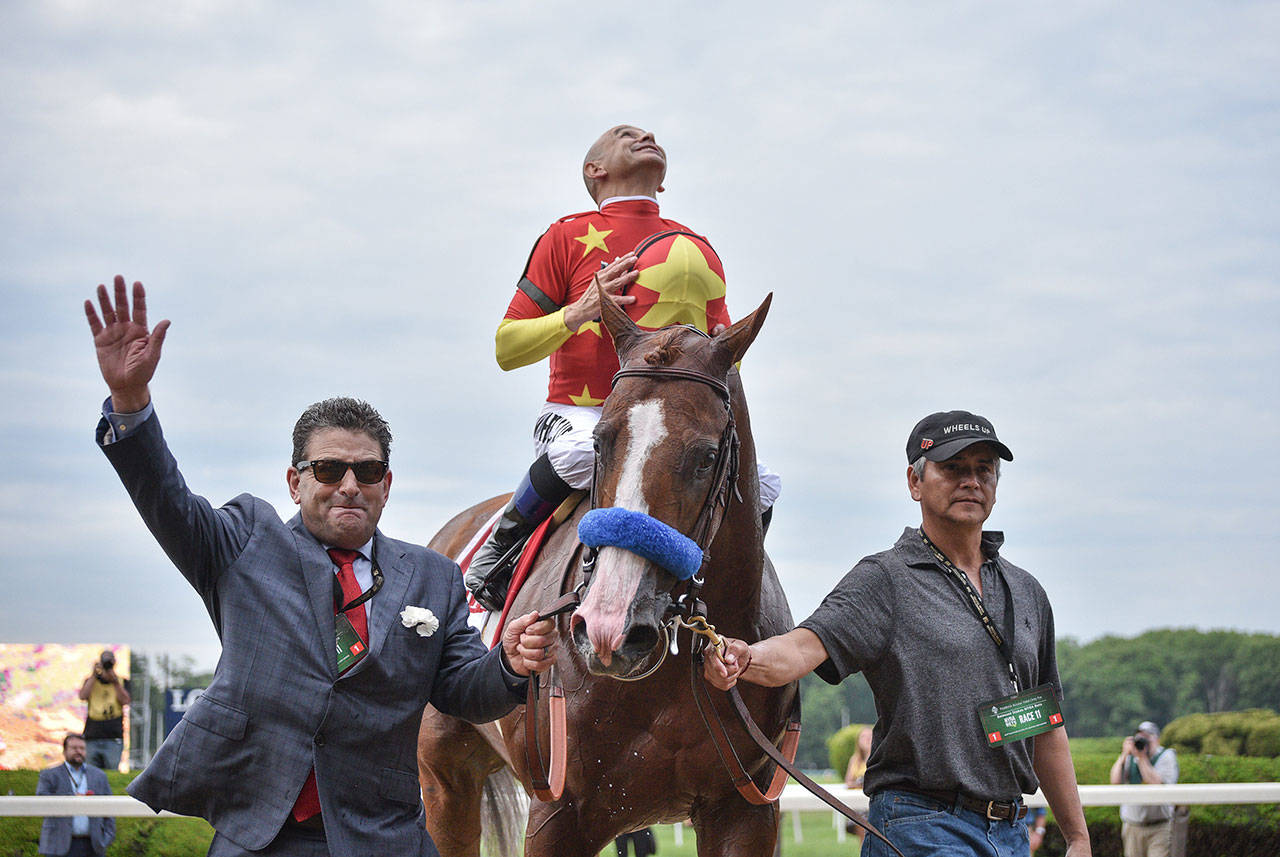By Childs Walker
The Baltimore Sun
The fates seemed to line up against Justify as he sought to become the 13th horse in history to win the Triple Crown.
From his tender heel the day after he won the Kentucky Derby to his tired performance in the Preakness to his starting position on the dreaded rail in the Belmont Stakes, he’d encountered obstacles that have defeated many an excellent horse.
It would take a great champion to render all those subplots meaningless.
Justify, as it turns out, is just that. And no one is likely to question it again after what he did Saturday evening at Belmont Park.
Getting a strong break and leading from start to finish, Justify, who went off at 4-5, held off Gronkowski, Hofburg and Vino Rossi.
Racing fans waited 37 years for a Triple Crown winner to succeed Affirmed. But just three years after American Pharoah reset the clock with his majestic performance at Belmont, the precocious, musclebound Justify shoved his way into thoroughbred racing’s most glorified club.
He and American Pharoah, both trained by Bob Baffert, have created a new era of stars, reminiscent of the 1970s, when three brilliant horses won the Triple Crown in a five-year span.
Forty years to the day after another big chestnut, Secretariat, swept the Belmont by an astonishing 31 lengths, Justify made his own brand of history, as did the humans who nurtured his remarkable gifts.
Baffert became just the second trainer to win two Triple Crowns, following James “Sunny Jim” Fitzsimmons, who won all three races with the father-son pair of Gallant Fox (1930) and Omaha (1935).
At age 52, jockey Mike Smith became the oldest rider to win the Triple Crown.
Justify became just the second horse, after Seattle Slew, to win it while still undefeated.
Few horses have ever come so far, so fast.
Justify lined up for his maiden start at Santa Anita Park on Feb. 18. Seventy-six days later, he won the Kentucky Derby, the first horse to do so without having run as a 2-year-old since Apollo in 1882. His shot at becoming the 13th Triple Crown winner came just 111 days into his career.
This shocking run wasn’t so shocking to those who watched Justify’s early moves on the track at Santa Anita. Baffert sensed he had a “monster” on his hands the first time he breezed the colt in January.
After NBC analyst Randy Moss watched Justify win that maiden race by 9 { lengths — despite a trip that had Baffert fuming at jockey Drayden Van Dyke — he called his colleague, Jerry Bailey, and said he had a new Derby favorite.
“It was the most impressive debut from a racehorse I have ever seen,” Moss recalled.
Smith climbed aboard for the next race on March 18 at a muddy Santa Anita. He could hardly believe the acceleration he felt underneath him when he asked the big horse to make a move midway through a 6 {-length victory. He quickly decided that in almost 40 years as a jockey, he’d never ridden a more gifted 3-year-old.
Justify broadcast his rare talent to the wider world at Churchill Downs, where he transcended a driving rain and 19 challengers to win the Derby by 2 { lengths. He inspired favorable comparisons to American Pharoah.
His story grew more complicated the next morning when he looked uncomfortable putting pressure on a bruised left hind heel. Questions about his stamina deepened at the Preakness, where he tired over another muddy track and held on to win by { a length.
That set up a familiar drama for the 1 {-mile Belmont. Would Justify fall victim to the fatigue and bad luck that had marked 13 failed Triple Crown bids between 1978 and 2015? Or would he become the rare horse, like American Pharoah, talented enough to overcome all obstacles?
He also faced questions he could not control. With the last Triple Crown just three years past, would casual sports fans embrace him as they had American Pharoah?
For the first time in this Triple Crown series, race day dawned sunny and dry. Baffert pronounced his champion ready to go after two weeks of ideal training. But he would not know for sure until the race went off, just before 7 p.m.



